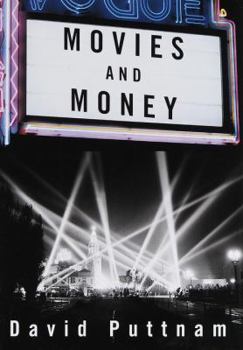Movies and Money
Select Format
Select Condition 
Book Overview
"A fascinating history."-- Time Out New York The acclaimed producer of such classic films as Chariots of Fire and The Killing Fields , and the only European ever to head a major Hollywood studio,... This description may be from another edition of this product.
Format:Hardcover
Language:English
ISBN:0679446648
ISBN13:9780679446644
Release Date:October 1998
Publisher:Alfred A. Knopf
Length:337 Pages
Weight:1.50 lbs.
Dimensions:1.2" x 6.7" x 9.6"
Customer Reviews
4 ratings
Excellent History
Published by Thriftbooks.com User , 18 years ago
Excellent book, with a fantastic, well-told industry history section. Some of the tone is a bit interesting - David Puttnam was head of Columbia Pictures, which is interesting to take into account when absorbing his views. Some of the details of the late history are off, particularly those surrounding the GATT talks which led to such a violent French-US disagreement, but overall the book should be required reading for anyone trying to understand the industry, film policy, and what makes Hollywood tick at a high level.
Excellent look at film...but not for the casual filmgoer
Published by Thriftbooks.com User , 19 years ago
This book does not have scandalous stories about stars and troubled film productions...if you're looking for those types of stories William Goldman and Peters Bart & Gruber have excellent titles that will give you insite into film and satisfy your pop culture curiosities. What Puttnam achieves is a detailed history of film that shows the struggle that filmmakers on both sides of the Atlantic attaining a balance between art and commodity. Puttnam offers great insights and introduction to film's early years. Coming from the unique view of a European who became a Hollywood insider, he's able to interpret history in a way that few others saw. Casual readers should look elsewhere, but people interested in the business of film and it's history on both sides of the Atlantic will find this book interesting and accessible.
Acidic analysis of the European movie industry.
Published by Thriftbooks.com User , 22 years ago
For insider David Puttnam, Europe who invented the movie, lost the movie industry battle due to external (two World Wars), but mostly internal causes:1. Europe, unlike the US, didn't see the movie industry as a totality (control of production + distribution + theatres)2. Europe didn't want to understand the market (the consumer demand) and the power of marketing.3. the suicidal movie theorization by the left. As an example, J.L. Godard claimed that his struggle against the commercial imperialism of Hollywood was analogous to the eternal struggle of the working class against monopoly capitalism. Yet he was forced to acknowledge that 'workers don't come to see my films'.4. the vanity of the European film critics, who supported selfregarding movies, while the public went out to see US films.5. social causes: Hollywood defied the wishes of the US cultural elite and made 'popular' movies.The movie industry in Europe has still not fundamentally changed since the publication of the book, but all inter- and subventions of the EEC commission will be wasted money, unless there is a big change of mind.The author gives implicitly some obvious measures for a revival:- take into account the consumer market.- a big part of the movie budget should be spent on marketing and promotion.More, there should be coproductions with TV channels and movie theatre companies on a European, or better, world scale. The market of each European country is not big enough to create a profitable movie industry. European big budget movies should be shot in English.It is easier said than done, but CANAL+ for instance has understood the challenge.Puttnam's book is absolutely not boring, but a must read for every European film maker.
Movies from an International and Financial Vantage Point
Published by Thriftbooks.com User , 23 years ago
David Puttnam (with Neil Watson) has written a book that has a different, and often very personal, perspective from the usual film histories. It is a broader, more international examination into the reasons for Hollywood gaining world wide dominance of the film industry. This is not about movies per se but is, instead, about the business and politics of making movies. It includes many anecdotes, told in a basically chronological format, from the beginning of the industry to the recent times. Much of this information was new to me as most film histories concentrate on the movies and the men and women who create these works. This one concentrates on the men who finance these works. An interesting book for those interested in the deals behind the deals that make the movies we love.





